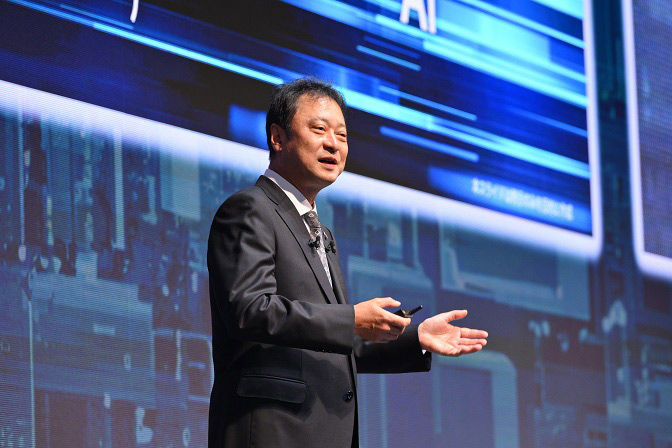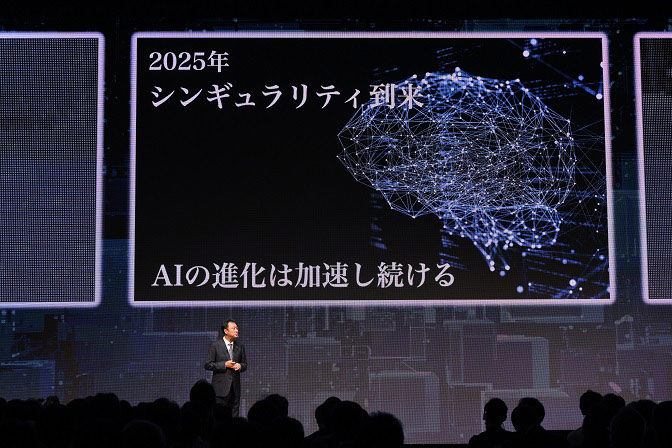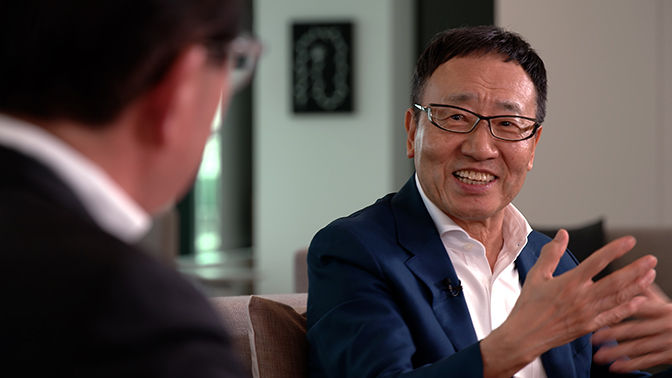
For the first time since 2019, SoftBank World, SoftBank's largest event for enterprise customers, returned as an in-person event in Tokyo. From October 4 to 6, SoftBank World 2023 showcased keynotes and panel discussions from technology luminaries, as well as smaller sessions. The exhibition hall, which featured cutting-edge DX and AI applications from partner and sponsor companies, also attracted thousands of visitors. A special online-only series of sessions also featured on October 3, or Day 0, of the event.
On Day 1, Junichi Miyakawa, President & CEO of SoftBank Corp. (TOKYO: 9434) gave a keynote presentation on how companies in Japan should face the 4th Industrial Revolution and SoftBank's initiatives to build next-generation social infrastructure.
Miyakawa: two more years until the Singularity

Miyakawa began by recounting various inventions, their practical applications and the “social implementation” of new technologies in different historical eras, beginning with the Industrial Revolution.
The time cycle from the invention of key technologies to their social implementation is getting shorter and shorter, he said. “It’s already been 60 years since AI was first proposed, so it’s not surprising that AI could be implemented into society at any time.”
Miyakawa said the arrival of the Singularity–the point at which artificial intelligence surpasses human intelligence–will be a major factor in AI adoption. In the computing world, as graphic processing units (GPUs) have overtaken central processing units (CPUs), the Singularity, which was originally thought to arrive in 2045, may now arrive in 2025. Miyakawa said that hardware that reaches this point could move the world toward the age of artificial general intelligence (AGI) where hardware learns and performs applied processing on its own.
“AI, the key technology of the future, will bring about an era of autonomy and optimization, in which AI will make its own decisions and optimize society as a whole. This is the Fourth Industrial Revolution, and we must now seriously consider how to live in harmony with AI,” he said.
Preparing for a society that co-exists with AI
Miyakawa cautioned, however, that while AI can be a useful tool, it also requires large amounts of energy to process huge volumes of data. The advent of generative AI has accelerated the implementation time frame, but by 2030, the computing power requirements equivalent to 3,800 systems of Japan’s supercomputer "Fugaku" and 580 large thermal power plants will be needed to process all of this data, he said.
Japan, however, with its small landmass and scarce natural resources, cannot afford to build thermal power plants on that type of scale. “So it’s necessary for Japan to increase its energy efficiency and develop new renewable energy sources,” Miyakawa said.
He stressed that an advanced computational infrastructure is essential for Japan's future, and the creation of a structure that supports the social implementation of AI needs to be considered.
Distributed data processing key to next-generation social infrastructure
Miyakawa noted that Japan’s data centers are currently concentrated in urban areas like Tokyo and Osaka. “We have our own data centers there, but overconcentration could trigger blackouts in large centers,” he cautioned.
To avoid this scenario, Miyakawa explained that SoftBank is working to decentralize data processing and power consumption, and evenly spread data processing across Japan. “We’re taking various measures to achieve this, but we believe we need a ‘Super-distributed Computing Infrastructure’ that efficiently distributes processing tasks while integrating siloed data and performing the processing of multiple computing infrastructures in parallel.”
He emphasized repeatedly that renewable energy will be key to enable this future infrastructure that consumes huge amounts of electricity.
No time to stand on sidelines with rapid growth of AI: Miyakawa
Toward the end of his presentation, Miyakawa predicted that the emergence of generative AI will change society at an unprecedented speed and scale. “The economic effects of the Fourth Industrial Revolution will be on an entirely different level compared to the Industrial Revolutions of the past.”
“Around the world, companies are already moving us toward a society where we co-exist with AI that surpasses human abilities,” he said. “In a society where we have to face AI that grows by the second, companies need to decide whether they will lead the way or stand on the sidelines.”
Miyakawa stated his belief that the 'imagination' of people living today will shape future norms. He said that only companies that can envision this can become leaders in this AI era. “I hope that in Japan as well, companies will emerge as driving forces in a society that is changing because of AI,” he said.
Miyakawa closed by saying that SoftBank is also accelerating its efforts toward realizing a society that co-exists with AI.
Related news
(Posted on October 16, 2023)
by SoftBank News Editors



